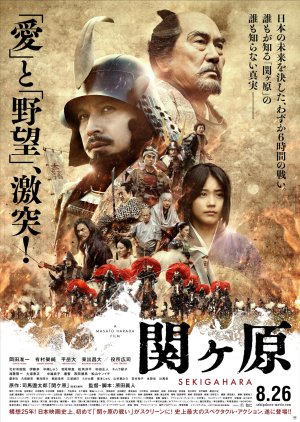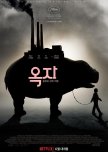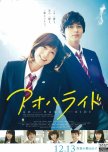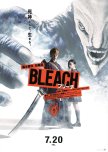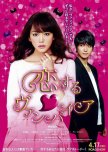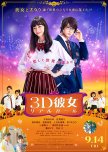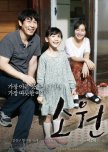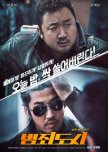
Needs a prerequisite on Japanese history during the Sengoku era before watching the movie
I've been wanting to watch this movie for soooo long! Being a fan of Japanese history AND a fan of Okada Junichi, watching this film is a must.I actually enjoyed the movie overall. However, it wouldn't be easy to recommend. This movie is made for those with a knowledge of Japanese history (Basically, the Japanese population who are forced to study it when they are in school). A newbie will not be able to understand the story, nor the stakes of this battle. I have watched numerous dramas about this era. I have also read about many of the lords involved in that decisive battle, so I managed to follow the story without too much trouble.
There are several things to appreciate in this movie. For starters, the acting of key figures in the movie were well cast and superbly performed. Okada Junichi continues to impress with his acting skills. This movie is a testament to how far he's come. I also could not have imagined a better actor to be cast as Tokugawa Ieyasu than Yakusho Koji. He managed to portray the many sides of Japan's third unifier despite the overall biased take of the events in this movie.
What I found interesting is the portrayal of "Ninja-wars" that happened alongside the story. Information was definitely key to winning the war. Therefore their portrayal brought clarity to how it happened.
The action here is portrayed realistically and beautifully. Nothing too gory, but bloody enough to understand the horror of it.
Yet, there were many issues in this movie that prevented me from giving it a better score. Narration is a big one. Narration is often done in Taiga dramas. However, in this movie, it is indistinguishable from the conversations done between characters. Another huge issue is the choppy editing throughout the whole movie. I know there is a huge amount of information to be portrayed, but I wish they had given more time to smoothen the scene-to-scene.
Another mini-complaint is putting the character Hatsume at the forefront of the movie when it is an imaginary character, who doesn't have any true effect on the story. I also find it weird that princess chacha/Yodo-done wasn't given much of a role in this movie when historically, she plays an important part in the events preceding the battle. The movie mentions the connection between Mitsunari and Yodo-dono, yet neither explored nor even portrayed.
Overall, I still enjoyed that movie despite its flaws. I recommend this movie solely if you have at least a working knowledge of the Sengoku era of Japanese history.
Vond je deze recentie nuttig?

Deze recentie kan spoilers bevatten
Well, this is such a disappointment! The movie looks like a "big budget" production, but I don't think non-Japanese could easily appreciate considering this is not a "festival" kind of movie and Sekigahara Battle itself is already hard to comprehend with involvement of many warlords throughout Japan.Firstly, the dialogs are damn fast. The characters talk like there's no tomorrow, one line after another. To make it worst, those lines contain important facts to the story flow.
I don't know about native English speaker, but my brain had to work double throughout the movie. First to understand the English subtitle, second to recall the facts of this largest battle in Japan (that I learned elsewhere) because the movie failed to explain it well enough with a lot of "scenes skipping" one after another. The narration could be done much better, otherwise it's indistinguishable from the actors lines.
Secondly, the interpretation of Ishida Mitsunari's action was not that logical. It feels like the character had already read history book in certain part. For example, he can predict what's going to happen with Kobayakawa but still giving him such a big role in the battle.
The movie was also trying to portray the other side of Mitsunari with his concern towards Princess Koma and after that her attendant (Arimura's character), but it feels more like a sugar coating than an interpretation.
Lastly, while Ishida Mitsunari is the main hero here and the movie feels like trying to give justice to him, it's damn strange not to include his family (wife and children) but more focusing on Arimura's character as love interest. Other than that, Lady Yodo (Chacha) also has no dialogs in this.
Overall, this unintentionally feels like a wannabe film despite the good acting and nicely done cinematography. The inclusion of "Er Hu" solo section in the orchestra used for background music is also questionable! (lol before watching I saw someone commented on the other "streaming site" questioning why use Chinese music for Japanese movie, so when I heard the Er Hu part I was like ROFL)
Vond je deze recentie nuttig?

Deze recentie kan spoilers bevatten
Ahistorical and convoluted
Combine "samurai warriors" with "basilisk kouga ninpou chou" and you will get this cursed, ahistorical abomination of the movie which only saving grace are obviously high production values, direction and acting.All wasted on trash "story" portraying historical characters as exaggerated caricatures straight out of samurai warriros so if you played that you know what to expect (mitsunari obsessed with justice, sakon being a cynical war veteran with scars on his face, etc. ), ninja with superhuman abilities who seem like they came from a shounen manga, and all kinda events that simply speaking never happened....starting with the beginning scene where hideyoshi met mitsunari as a child in a temple, which is just an apocryphal rumor, and in reality he first met mitsunari when he was already 18. Or the scene where Kiyomasa Kato wanted to kill Mitsunari, but the latter found refuge in Ieyasu's mansion, portrayed many times as a stage in samurai warriors and completely untrue to history as Ieyasu didn't have any mansion there and likely no assassination attempt even happened there.
This movie is shilling Mitsunari side, and they overdid it hard. I dislike how they portrayed Tokugawa Ieyasu as a complete villain, while writing Mitsunari as a saint. Even his mistakes were because of his good nature.
For example, in the movie he wasn't caught by peasants while trying to run away from the battle. Noo, he was cared for by them and then refused to leave even when the villagers advised him to when Tokugawa troops approached, because he feared the villagers will be executed for helping him and he would rather die then fail to repay his debt to the villagers. Of course, there is zero historical evidence for that, it's just one of many examples of the author wanting to paint Mitsunari as a kind hearted idiot rather than a cowardly villain.
There were also sus moments of technical nature: teppo firing twice in one scene, flat wooden shield stopping a teppo shot, blind yoshitsugu fighting with a spear, crossbows in sekigahara, ashigaru training with swords and shields, and sus amounts of swords on battlefield that should be dominated by spears.
That being said, could be worse: armors weren't paper here, and they actually had to aim for openings in armors to kill their enemies. Overall, individual fight scenes were well done. The group fight scenes weren't so bad either: soldiers actually fought in formations, although chaotically. The blood looked good, and the weapons and armors looked real.
The music is fine but nothing special. The entire romance between Mitsunari and fictional ninja girl was pretty much non existent, so the genre romance is misapplied to this movie.
As many other people said, to understand what is going on here you need to know of the events portrayed in the movie, as well as who is who, as the movie itself haphazardly jumps from one scene to another without explaining what is happening and why. And as I said before, because of various historical inaccuracies and "alternate" interpretations on these historical events, I wouldn't recommend this movie to people who want to learn japanese history.
Vond je deze recentie nuttig?

